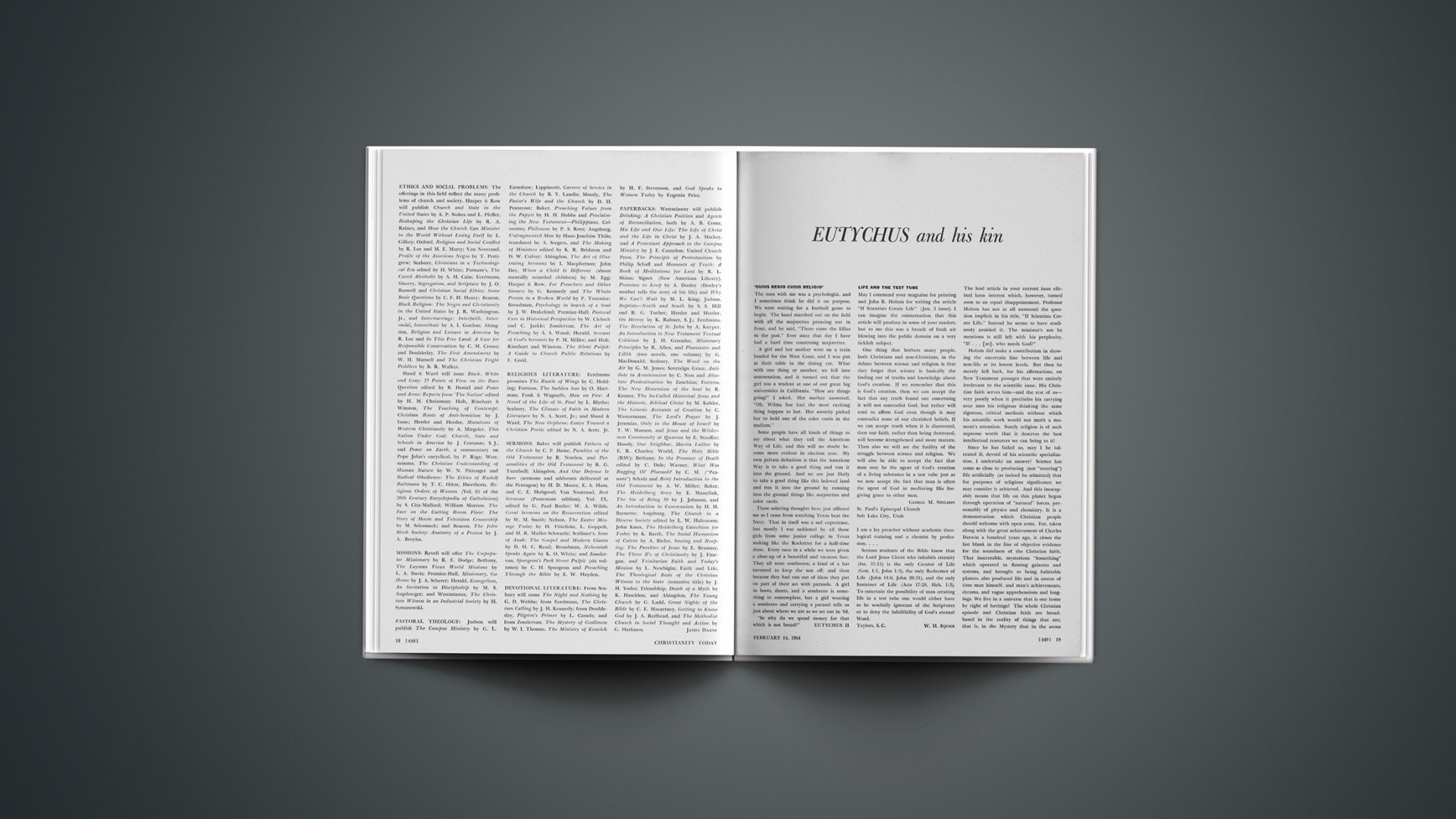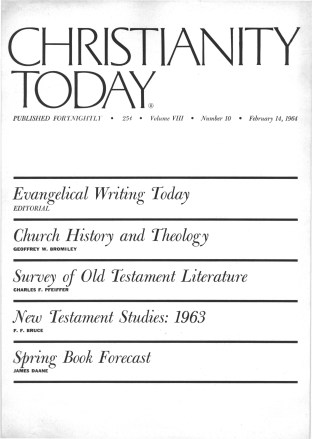‘CUIUS REGIO CUIUS RELIGIO’
The man with me was a psychologist, and I sometimes think he did it on purpose. We were waiting for a football game to begin. The band marched out on the field with all the majorettes prancing out in front, and he said, “There come the fillies to the post.” Ever since that day I have had a hard time construing majorettes.
A girl and her mother were on a train headed for the West Coast, and I was put at their table in the dining car. What with one thing or another, we fell into conversation, and it turned out that the girl was a student at one of our great big universities in California. “How are things going?” I asked. Her mother answered, “Oh, Wilma Sue had the most exciting thing happen to her. Her sorority picked her to hold one of the color cards in the stadium.”
Some people have all kinds of things to say about what they call the American Way of Life, and this will no doubt become more evident in election year. My own private definition is that the American Way is to take a good thing and run it into the ground. And we are just likely to take a good thing like this beloved land and run it into the ground by running into the ground things like majorettes and color cards.
These sobering thoughts have just afflicted me as I came from watching Texas beat the Navy. That in itself was a sad experience, but mostly I was saddened by all those girls from some junior college in Texas making like the Rockettes for a half-time show. Every once in a while we were given a close-up of a beautiful and vacuous face. They all wore sombreros, a kind of a hat invented to keep the sun off; and then because they had run out of ideas they put on part of their act with parasols. A girl in boots, shorts, and a sombrero is something to contemplate, but a girl wearing a sombrero and carrying a parasol tells us just about where we are as we set out in 64.
“So why do we spend money for that which is not bread?”
EUTYCHUS II
LIFE AND THE TEST TUBE
May I commend your magazine for printing and John R. Holum for writing the article “If Scientists Create Life” (Jan. 3 issue). I can imagine the consternation that this article will produce in some of your readers, but to me this was a breath of fresh air blowing into the public domain on a very ticklish subject.
One thing that bothers many people, both Christians and non-Christians, in the debate between science and religion is that they forget that science is basically the finding out of truths and knowledge about God’s creation. If we remember that this is God’s creation, then we can accept the fact that any truth found out concerning it will not contradict God, but rather will tend to affirm God even though it may contradict some of our cherished beliefs. If we can accept truth when it is discovered, then our faith, rather than being destroyed, will become strengthened and more mature. Then also we will see the futility of the struggle between science and religion. We will also be able to accept the fact that man may be the agent of God’s creation of a living substance in a test tube just as we now accept the fact that man is often the agent of God in mediating His forgiving grace to other men.
GEORGE M. SHELDON
St. Paul’s Episcopal Church
Salt Lake City, Utah
I am a lay preacher without academic theological training and a chemist by profession.…
Serious students of the Bible know that the Lord Jesus Christ who inhabits eternity (Isa. 57:15) is the only Creator of Life (Gen. 1:1; John 1:3), the only Redeemer of Life (John 14:6, John 20:31), and the only Sustainer of Life (Acts 17:28; Heb. 1:3). To entertain the possibility of man creating life in a test tube one would either have to be woefully ignorant of the Scriptures or to deny the infallibility of God’s eternal Word.
Taylors, S. C.
W. H. SQUIER
The lead article in your current issue elicited keen interest which, however, turned soon to an equal disappointment. Professor Holum has not at all answered the question implicit in his title, “If Scientists Create Life.” Instead he seems to have studiously avoided it. The minister’s son he mentions is still left with his perplexity, “If … [so], who needs God?”
Holum did make a contribution in showing the uncertain line between life and non-life at its lowest levels. But then he merely fell back, for his affirmations, on New Testament passages that were entirely irrelevant to the scientific issue. His Christian faith serves him—and the rest of us—very poorly when it precludes his carrying over into his religious thinking the same rigorous, critical methods without which his scientific work would not merit a moment’s attention. Surely religion is of such supreme worth that it deserves the best intellectual resources we can bring to it!
Since he has failed us, may I be tolerated if, devoid of his scientific specialization, I undertake an answer? Science has come so close to producing (not “creating”) life artificially (as indeed he admitted) that for purposes of religious significance we may consider it achieved. And this inescapably means that life on this planet began through operation of “natural” forces, presumably of physics and chemistry. It is a demonstration which Christian people should welcome with open arms. For, taken along with the great achievement of Charles Darwin a hundred years ago, it closes the last blank in the line of objective evidence for the soundness of the Christian faith. That inscrutable, mysterious “Something” which operated in flaming galaxies and systems, and brought to being habitable planets, also produced life and in course of time man himself, and man’s achievements, dreams, and vague apprehensions and longings. We live in a universe that is our home by right of heritage! The whole Christian episode and Christian faith are broad-based in the reality of things that are; that is, in the Mystery that in the aeons of its working had manifested purpose, intelligence, and good. One shrinks from the bald claim that science has brought us to a biblical faith; but the line of thought precipitated by the artificial production of life leads to conclusions not far removed.
Professor Holum’s half-apologetic hesitation reads too much like the opening salvo in a war of words such as disgraced both science and religion in the later nineteenth century. God forbid that we repeat that folly!
WILLIAM A. IRWIN
Emeritus Professor of Old Testament
University of Chicago
Southern Methodist University
Dallas, Tex.
If … “science may someday create life,” I would be amazed at the feat, but I would, in no wise, think that “it would be fun” to be part of that future team. I would think, instead, that the prophecy of Revelation 13:15 was about to be fulfilled, and that the source of the “miracle” was not God, but Satan.
The Christian who is a true scientist must, in reverence for God and his Word, draw a line beyond which only the godless may go; and beyond which, in becoming “like God” they attain the goal first set by Satan in the Garden; only to find that they have not become “godlike.”
WILLIAM G. LOWE
Berlin Bible Church
Narrowsburg, N. Y.
For many years, the scientists have been proving their solid ground of hard facts was unsteady. This is not to disparage what the scientist is doing. It does remind us that the best scientists have the most searching questions [about] the ultimate solidity of the ground on which they stand.
Dr. John R. Holum … has certainly earned the deserving applause of both the evangelical and scientific communities. He has ably demonstrated that the most solid ground upon which one can stand to view the world … is that of Christian faith.
TED MALLINCKRODT
Court Street Methodist Church
Fulton, Mo.
DEATH OF THE PRESIDENT
Your editorial comment, “Light Out of Darkness” (Dec. 20 issue), was probably inspired in intent, but it was also extremely shallow in facts. You have attempted to emulate the left-wing extremists by association of a tragedy with some sort of “national” sin.…
C. D. RIAL, JR.
Hayward, Calif.
The editorial “searches the heart and the mind” and says things that need to be said and heeded about repentance for our toleration of violence and extremism and our need to cleanse our hearts of hatred. Thank you for it.
CLYDE V. SPARLING
Cattaraugus, N. Y.
My husband and I had already read “Light Out of Darkness,” and this morning very early I read it aloud as part of Advent devotions. Congratulations …! I’m writing the editor of The Catholic World as well as our daughter, Sister Margaret Ann, S. N. D., about this special editorial and its perfect Christian message, its own shining in the darkness of these days.
MRS. JOHN A. HESS
Athens, Ohio
The various comments on the death of the President were quite interesting (Dec. 20 issue, p. 39). I was, however, quite disturbed by the comment of Eugene Carson Blake and Silas G. Kessler that “those who have been making irresponsible attacks upon [President Kennedy] and his policies are as responsible for his death as the one who pulled the trigger.”
Certainly, irresponsible attacks and statements are to be deprecated, but they do not cause the death of anyone. Former President Hoover was certainly the object of many irresponsible attacks, but they did not kill him. What caused the death of our late President was the bullet of the assassin, that, and that alone. Had that bullet not been fired, the President would have continued to live, no matter how many irresponsible attacks had been made. It has been a long time since I have read any statement as irresponsible as that of Blake and Kessler.
EDWARD J. YOUNG
Professor of Old Testament
Westminster Seminary
Philadelphia, Pa.
I would like to disavow any guilt for the assassination of President Kennedy. It is the stated policy of the Marxist revolution of which Oswald was a part to “openly declare that their ends can be attained only by the forcible overthrow of all existing social conditions. Let the ruling classes tremble …” (quote from the Communist Manifesto).
I oppose Communism and its left-leaning apologists both within and outside of our country. I am openly opposed to the ideas and methods of Communism in whatever form and in whatever way they may appear. If the left wing would like to assume part of the blame for the dastardly act they may, but as for me, I disavow it. Why should one who opposes the devil be responsible for the devil’s treacherous deeds?
H. FEISTNER
Emmanuel Evangelical Lutheran Church
Oregon, Ill.










